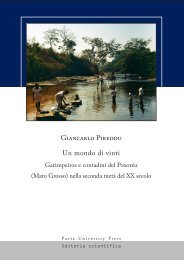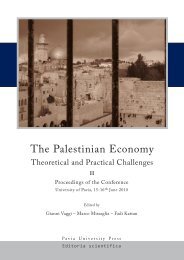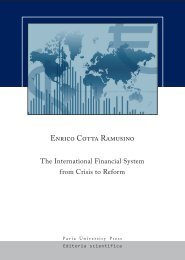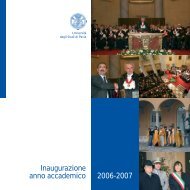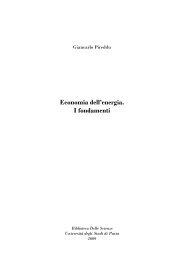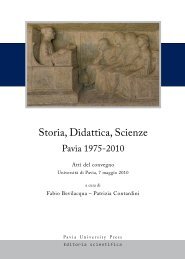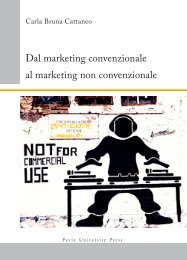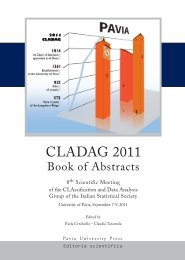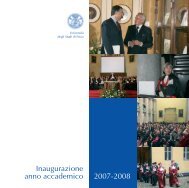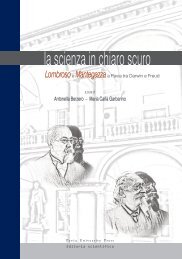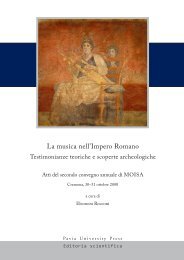Musica che affronta il silenzio - Scritti su Toru Takemitsu - Pavia ...
Musica che affronta il silenzio - Scritti su Toru Takemitsu - Pavia ...
Musica che affronta il silenzio - Scritti su Toru Takemitsu - Pavia ...
You also want an ePaper? Increase the reach of your titles
YUMPU automatically turns print PDFs into web optimized ePapers that Google loves.
Music Facing Up to S<strong>il</strong>ence. Writings on Tru Takemit<strong>su</strong><br />
In his contribution Henry Cowell paraphrased the conference title: ‘The history of<br />
Western music is the opposite of a East-West Music Encounter’ (Cowell 1961: 71).<br />
Wh<strong>il</strong>e the reciprocal attraction that characterises the present is undoubtedly positive, the<br />
status quo reflects a scission going back to the dawn of written music in the West. By<br />
codifying melody in the diatonic modes, attention was focused ever more narrowly on the<br />
dimensions of harmony and counterpoint. As a re<strong>su</strong>lt of an inscrutable process of<br />
contrary and opposing forces, it has been precisely melody and rhythm, kept in a<br />
rudimental state in Western art music, that have undergone a considerable development in<br />
the East. Cowell admonished his audience that not only was the age-old prejudice of<br />
Westerners vis à vis Asiatic music (viewed as primitive and monotonous precisely<br />
because it was not particularly developed in the dimensions which were most catered for<br />
by Western notation) a consequence of the historical process, but that also the emergence<br />
of a genuine interest for the East would have been impossible if Western music styles had<br />
not begun to ‘lose their vitality toward the end of the 19 th century’ (Cowell 1961: 72). In<br />
fact the new interest being taken by Western composers in is<strong>su</strong>es in Eastern music has<br />
much more to do with the critique of the aesthetic and technical bases of tonal<br />
composition than might appear at first sight. Moreover Cowell argued that without an<br />
understanding of the historical background to these types of music, the whole is<strong>su</strong>e would<br />
be much more daunting; hence the need for a ‘comparative musicology’, which he had<br />
already championed in an article written in 1935 following a lengthy period spent in<br />
Berlin (Cowell 2001). This need <strong>su</strong>rfaced repeatedly during the Tokyo Conference, and<br />
in the closing session the standing committee, presided over by Yehudi Menuhin,<br />
proposed the creation of an International Institute for Comparative Music Studies. 3<br />
This initiative taken by the numerous musicians who gathered in Tokyo reveals a precocious<br />
intuition of the processes of globalization. <strong>Musica</strong>l traditions in the East were already<br />
under threat from the imposition of a hegemonic cultural paradigm, and their preservation<br />
was described by the conference participants as a sort of civic mission on a global scale. We<br />
can point to at least two spheres of 20 th century musical production in which linguistic amalgamation<br />
is immediately recognisable: avant-garde and pop music. Although the former only<br />
has a restricted circle of exponents and con<strong>su</strong>mers, it is characterised by a universalistic vocation<br />
which is not always conscious or explicit. In fact avant-garde regards itself as the most<br />
recent stage in the development of art music and thus as an integral part of an educational<br />
system which can be exported to other parts of the world. Pop music, on the other hand, is the<br />
product of industrial society and thanks to the new media and their potential for all-pervasive<br />
communication, disseminates the model of the American pop song worldwide with its social,<br />
ideological and behavioural connotations. Sonorities extraneous to this model can be introduced<br />
to give it more appeal, but <strong>su</strong>ch modifications are transient and do not affect the<br />
3 Cf. Music – East and West (1961: 227). This proposal may well have led to the founding of the Internationales<br />
Institut für Traditionelle Musik in West Berlin (1963); Danielou was the first director.<br />
109



